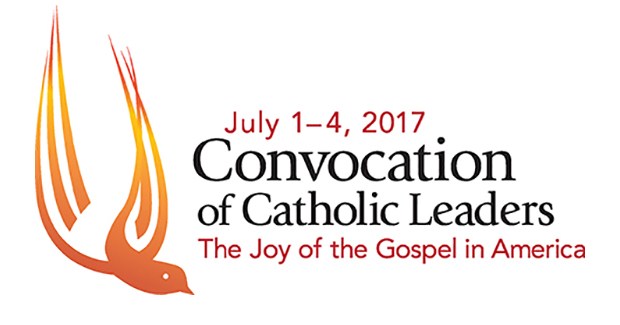In answer to Pope Francis’ call for the Church to enter a “new phase of evangelization,” the bishops of the United States have organized a Convocation of Catholic Leaders, which begins today in Orlando.
The purpose for gathering leaders and experts—clerical and lay—from all corners of the Church’s life is to assess the current state of evangelization in America and to explore new means of spreading the gospel. Thousands are expected to attend.
Following Pope Francis’ example in Evangelii Gaudium (The Joy of the Gospel), the Holy Father’s master plan for evangelical renewal, organizers have centered the convocation’s deliberations on joy, namely “the gospel joy that enlivens the community of disciples” (par. 21).
At the Second Vatican Council, the Church recognized herself to be “missionary by nature” (cf. Ad Gentes, 2). For three generations now, this truth as percolated in Christian minds, leading theologians and pastors to appreciate how individual discipleship itself is also essentially missionary. Thus we hear much talk today about “missionary discipleship,” a concept that the bishops want to develop at this weekend’s convocation.
Again, Pope Francis provides the catalyst for discussion. In Evangelii Gaudium, he writes: “Every Christian is a missionary to the extent that he or she has encountered the love of God in Christ Jesus: we no longer say that we are ‘disciples’ and ‘missionaries,’ but rather that we are always ‘missionary disciples’” (par. 120).
To guide the convocation’s four-day study of missionary discipleship, organizers have proposed four principal questions for discussion.
First: “What is the nature of this current historical moment in the Church and in our nation?” In typical Francis-like fashion, the convocation will begin with an exercise in discernment. Where are we? How have we gotten here? Where are we going? What are the signs of the times, and what illusions might we harbor about them? More than just a sociological survey of religion and society, the convocation’s opening discussions aim to grasp the Church in America’s current evangelical moment.
Second, participants will ask: “How do we respond to this moment as missionary disciples?” The challenge here, as organizers see it, is to assess how the Church lives and breathes at the local level, in parishes and dioceses. Is the Church’s pastoral work aimed simply at “maintaining the shop,” so to speak, or is it carried out in what Pope Francis calls a “missionary key” (par. 33)? In other words, do pastors and leaders only look inward with self-sustaining interest, or do they also look outward with evangelical zeal? More concretely, how can parishes and dioceses strike a balance between their inward and outward visions? In answering these questions, participants will have the opportunity to reflect on Pope Francis’ call to embrace the “missionary option” (par. 27).
Third: “Where are we called to go? To whom are we being sent on this mission?” In answer to this question, convocation participants will look to Pope Francis’ beloved “peripheries,” those in the parish, in the diocese, and in society. The peripheries are found anywhere there are people who need to hear the gospel. Since to them the gospel must be preached, the disciple is obligated to go to them—to the peripheries—to preach it. Often, this requires the disciple to leave what is familiar in order to bring the word of God to others, the goal being to draw those living in unfamiliar worlds into the familiar life of the Church. Christian engagement with the secular world, especially in the public square, will constitute a major part of this discussion.
Finally, convocation participants will ask: “What do we do when we get there? How will we engage the mission?” With this fourth question the convocation’s deliberations will turn to practical concerns, as developing strategies and best practices for missionary discipleship will become the topic of discussion. Specifically, participants will ask, according to organizers: “How can each and every one of us, from bishops to parish leaders to Catholics in the pews, truly be ‘Spirit-filled evangelizers’ with a heart directed toward Jesus Christ, the Gospel, and the People of God?”
Besides numerous plenary sessions and breakout discussions, the convocation’s itinerary is filled with prayer and other devotional activities. As one would expect, Mass will be offered each day. A Eucharistic procession has been planned for one morning, and Marian devotions for one evening. Confessions will be heard throughout the convocation, and a chapel has been created for private prayer before the Blessed Sacrament. Participants have been urged for weeks to prepare spiritually for the convocation, and on arrival they will find plenty to support their continued prayers.
The convocation runs through Tuesday, July 4. To follow the events on social media, use the hashtag #CatholicConvo. For the duration of the convocation, Aleteia will publish stories and interviews from Orlando.

